
What is Salmon Oil for Dogs? Benefits, Dosage, and Quality Explained
Overview
Have you ever worried about your dog's health? As a loving dog owner, you want to ensure your furry friend thrives. Salmon oil for dogs is a wonderful dietary supplement, rich in omega-3 fatty acids like EPA and DHA. This natural remedy offers numerous health benefits, including:
- Improved skin and coat condition
- Joint support
- Enhanced cognitive function
Incorporating high-quality salmon oil into your dog's diet can promote their overall well-being. However, it's essential to follow proper dosage guidelines. Consulting with your veterinarian is crucial to avoid any potential side effects. By taking these steps, you can help your beloved pet enjoy a healthier, happier life.
Introduction
Have you ever worried about your dog's health? As a loving pet owner, you want the best for your furry friend, and salmon oil has emerged as a popular supplement that can enhance your pet's health and vitality. Packed with essential omega-3 fatty acids, it offers a myriad of benefits, from promoting a shiny coat to alleviating joint discomfort.
However, navigating the vast options available can be overwhelming. It’s crucial to understand the right dosage and quality to ensure optimal results. So, what should you consider when incorporating salmon oil into your canine companion's diet? How can you maximise its health benefits? By exploring these questions, you can make informed choices that support your dog's well-being.
Define Salmon Oil: Composition and Sources
Have you ever worried about your dog's health? Fish oil, a dietary supplement derived from the fatty tissues of fish, may be the answer you’re looking for. Renowned for its high concentration of omega-3 fatty acids, particularly eicosapentaenoic acid (EPA) and docosahexaenoic acid (DHA), fish oil plays a crucial role in supporting various physiological functions in dogs. These essential fatty acids contribute to immune response, skin condition, and cognitive function. Sourced from both wild-caught and farmed fish, the highest quality oils are typically obtained through cold-pressing methods, helping maintain their nutritional integrity.
Adding salmon oil for dogs to their diet can provide numerous wellness advantages. Omega-3 fatty acids promote healthy skin and a glossy coat, alleviating issues such as itchiness, dryness, and flakiness. Moreover, these fatty acids possess anti-inflammatory characteristics that can greatly enhance joint condition, especially in older canines or those experiencing osteoarthritis. This results in improved mobility and heightened energy levels. Scooch's vet-formulated supplements, enriched with high-quality omega-3s, Vitamin E, Glucosamine, and Chondroitin, are designed to support these critical aspects of canine well-being.
Research indicates that a diet rich in omega-3s can strengthen the immune system of canines at all life stages, providing immune-boosting benefits even for healthy pets. For example, a case study indicated that canines supplemented with EPA and DHA demonstrated enhanced cognitive performance, illustrating the significance of these nutrients for brain function. Additionally, omega-3 supplementation has been associated with decreased pain levels in canines, particularly those with joint problems or inflammatory conditions, further emphasising the specific wellness advantages of Scooch's formulations.
Furthermore, omega-3 fatty acids can help alleviate anxiety in pets, contributing to their overall mental well-being. It’s important to note that not all omega-3 supplements contain sufficient EPA and DHA, so choosing reputable brands like Scooch is essential. Consulting a veterinary when introducing fish oil supplements into your dog's diet is crucial to ensure safe and effective use. Potential side effects, such as gastrointestinal upset, should also be considered.
In summary, salmon oil for dogs acts as a powerful source of omega-3 fatty acids, providing various nutritional advantages that enhance the overall well-being of canines. By incorporating this supplement into their diet, pet owners can help guarantee their pets receive the essential nutrients required for optimal well-being, particularly through the premium, vet-formulated supplements offered by Scooch.

Explore Health Benefits: Skin, Coat, and Joint Support
As a loving pet owner, have you ever worried about your dog's health, especially their skin and coat? Salmon oil for dogs can be a true powerhouse of benefits, particularly in enhancing skin and coat quality. The omega-3 fatty acids, specifically EPA and DHA, found in fish oil play a crucial role in reducing inflammation, significantly alleviating skin irritations and allergies. These essential fatty acids also support the production of sebum, a natural oil that moisturises the skin and combats dryness, resulting in a shinier coat.
Moreover, fish oil promotes joint well-being by lubricating joints and reducing stiffness. This is especially beneficial for older dogs or those experiencing arthritis. Regular supplementation can lead to improved mobility and overall vitality, helping your pets remain active and comfortable as they age.
With Scooch's AI-driven health assistant, you can easily complete a brief vet-defined quiz to receive personalised treatment plan suggestions. These plans include the best application of fish oil alongside Scooch's vet-formulated supplements, which focus on digestion, immunity, energy, skin, joints, and nutrient balance. It's recommended to provide 1 ml of fish oil for every 3 kg (6.6 lb) of your dog's weight to maximise these benefits, in line with Scooch's tailored treatment plans.
However, it's important to be mindful that overdosing on fish oil can lead to side effects such as hypervitaminosis D, vomiting, and diarrhoea. While fish oil can greatly enhance your dog's well-being, it should never replace a balanced diet. Significantly, many customer testimonials highlight the effectiveness of Scooch's supplements, with numerous pet owners reporting remarkable improvements in their pets' conditions, including relief from itching and dry skin.
By integrating salmon oil for dogs into your dog's diet, along with Scooch's targeted health solutions, you can proactively enhance your furry friend's health and well-being. Your pet deserves the best, and with the right support, you can help them thrive.
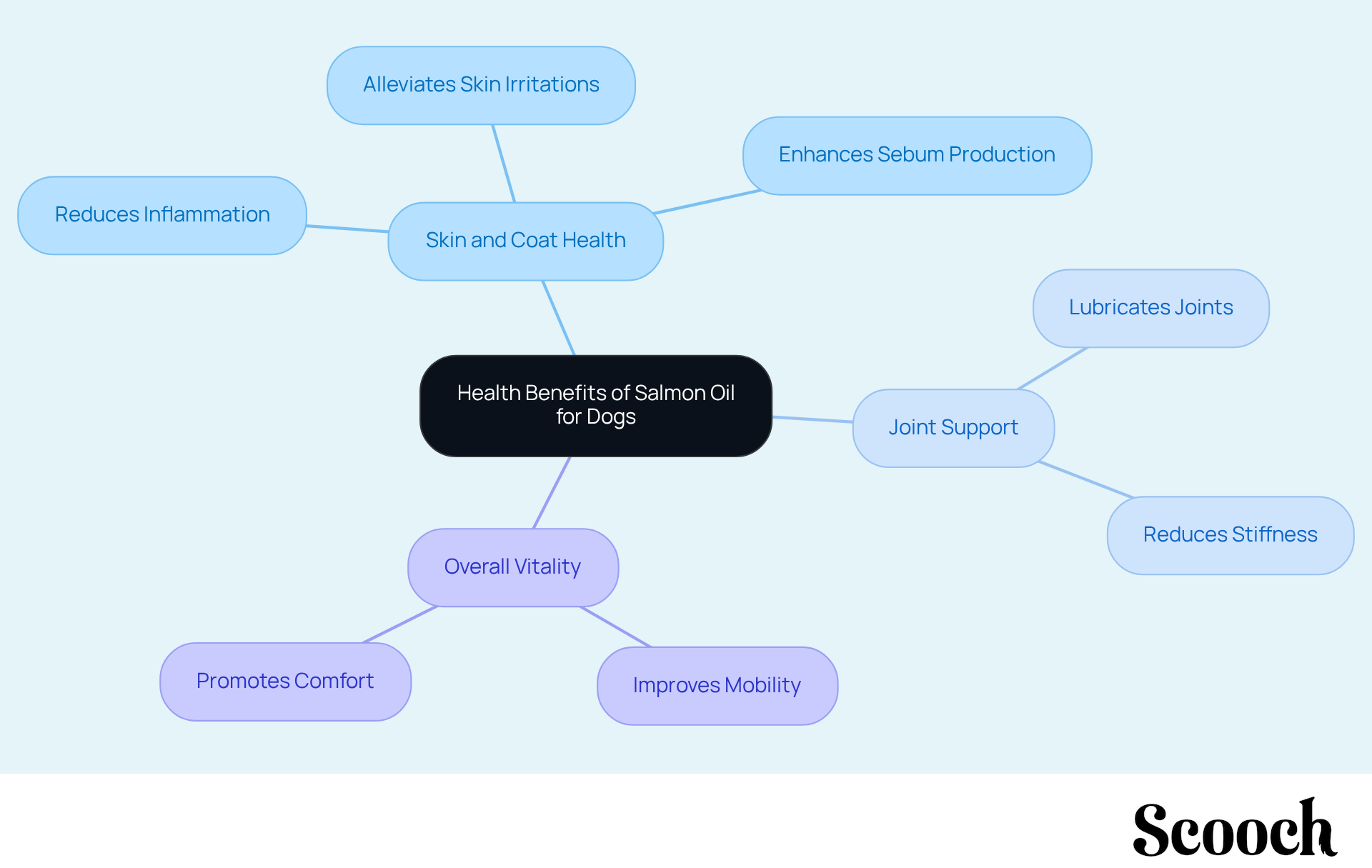
Incorporate Salmon Oil: Dosage and Administration Tips
Have you ever worried about your dog's health? Including salmon oil for dogs in your dog's diet is a wonderful way to support their well-being, but it does require careful attention to dosage to avoid over-supplementation. A widely recognised guideline suggests giving:
- 1 teaspoon of fish oil for every 10 pounds of body weight, with a maximum dosage of 12 pumps per day.
- For small dogs (less than 9 kg), 1 chew is recommended.
- For medium dogs (10-18 kg), 2 chews.
- For large dogs (18-36 kg), 3 chews.
- For giant dogs (over 36 kg), 4 chews.
Starting with a smaller dose and gradually increasing it can help your dog's digestive system adapt. Moreover, one pump of fish oil is equivalent to 1 teaspoon, making it easier to measure.
In addition, salmon oil for dogs can be easily added to your dog's meals by drizzling it over their regular food or mixing it in, which enhances the meal's appeal. However, it's crucial to observe your dog for any signs of digestive discomfort after introducing fish oil. Always consult with a veterinary before adding any new supplement to ensure it aligns with your dog's specific health needs.
For optimal results, consistency in incorporating fish oil into your dog's diet is essential. Scooch recommends long-term use of their vet-formulated supplements to maximise benefits. Their hypoallergenic chews are suitable for canines over 12 weeks old, making them a great choice for sensitive pups. Plus, subscribing to Scooch can provide you with significant savings and additional perks, ensuring your dog receives the best care possible.
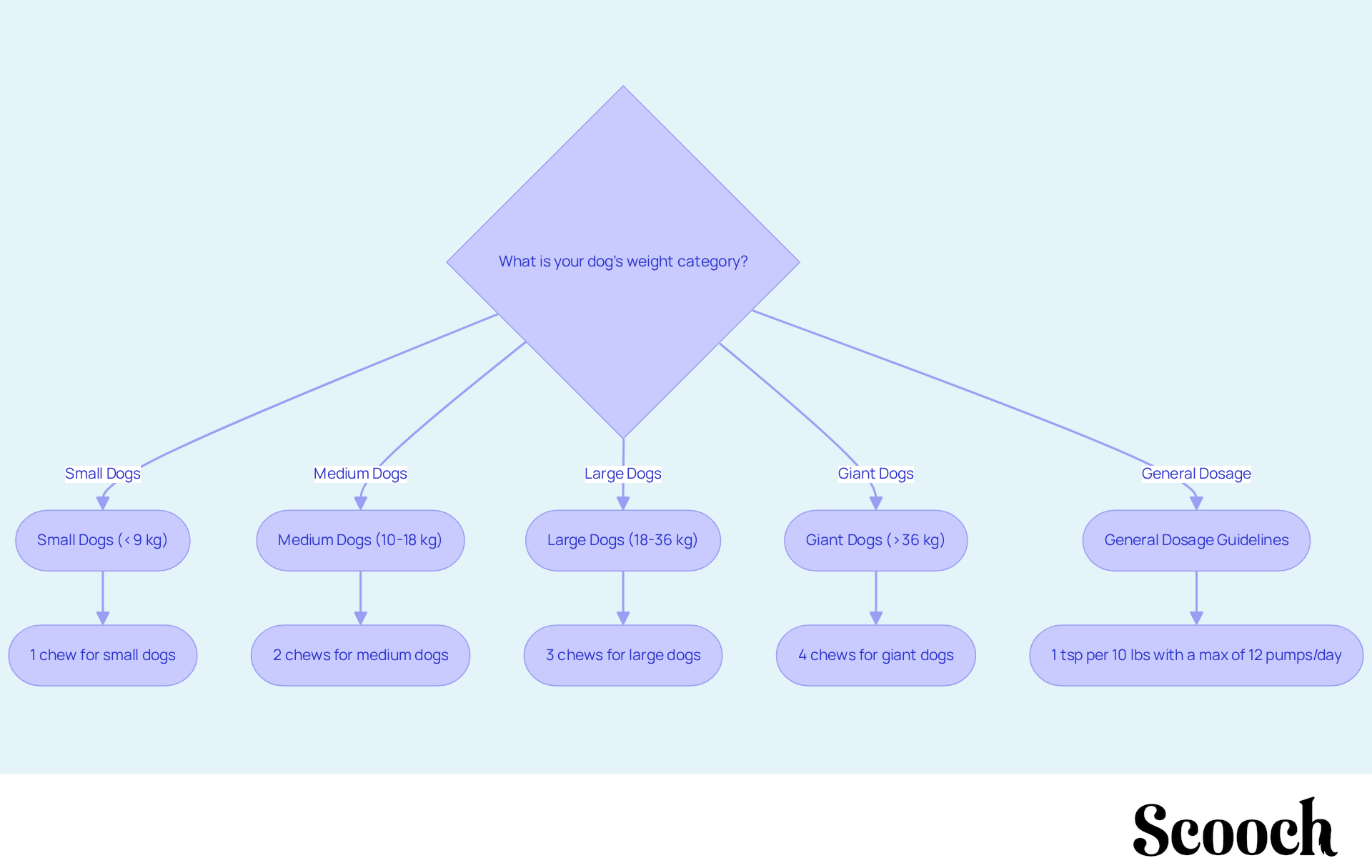
Understand Extraction Methods: Quality and Purity of Salmon Oil
As a dog owner, have you ever worried about your furry friend’s health? Ensuring your pet receives the best nutrition is vital, and the extraction techniques used for fish oil play a significant role in assessing its quality and purity. Cold-pressing stands out as the preferred method, effectively preserving delicate omega-3 fatty acids, including DHA, without exposing the oil to heat or harmful chemicals. This careful approach maintains the oil's nutritional value and minimises oxidation risks, which can degrade essential fatty acids crucial for your dog's digestion, immune support, and overall wellness.
In addition to cold-pressing, there’s an exciting alternative: supercritical fluid extraction (SFE). According to Dr. Sagrario Beltrán, 'supercritical fluid extraction may be a useful method to prevent lipid oxidation, especially in fish oils rich in omega-3, and to reduce significantly the amount of certain pollutants such as some arsenic species.' This innovative method operates under conditions that prevent oxidation of polyunsaturated fatty acids, making it a fantastic option for obtaining high-quality oil that supports skin and coat health, joint support, and natural energy levels.
Moreover, it’s essential to ensure that high-quality fish oil undergoes stringent testing for contaminants, including heavy metals and PCBs, to guarantee safety for your canine companion. As a pet owner, look for products labelled as '100% pure' and sourced from sustainable fisheries. This transparency in sourcing and production is crucial for selecting premium salmon oil. By prioritising these factors, you can be confident that you are providing your beloved pet with a beneficial supplement that supports their overall health and well-being, in line with Scooch's commitment to high-quality, vet-formulated ingredients.
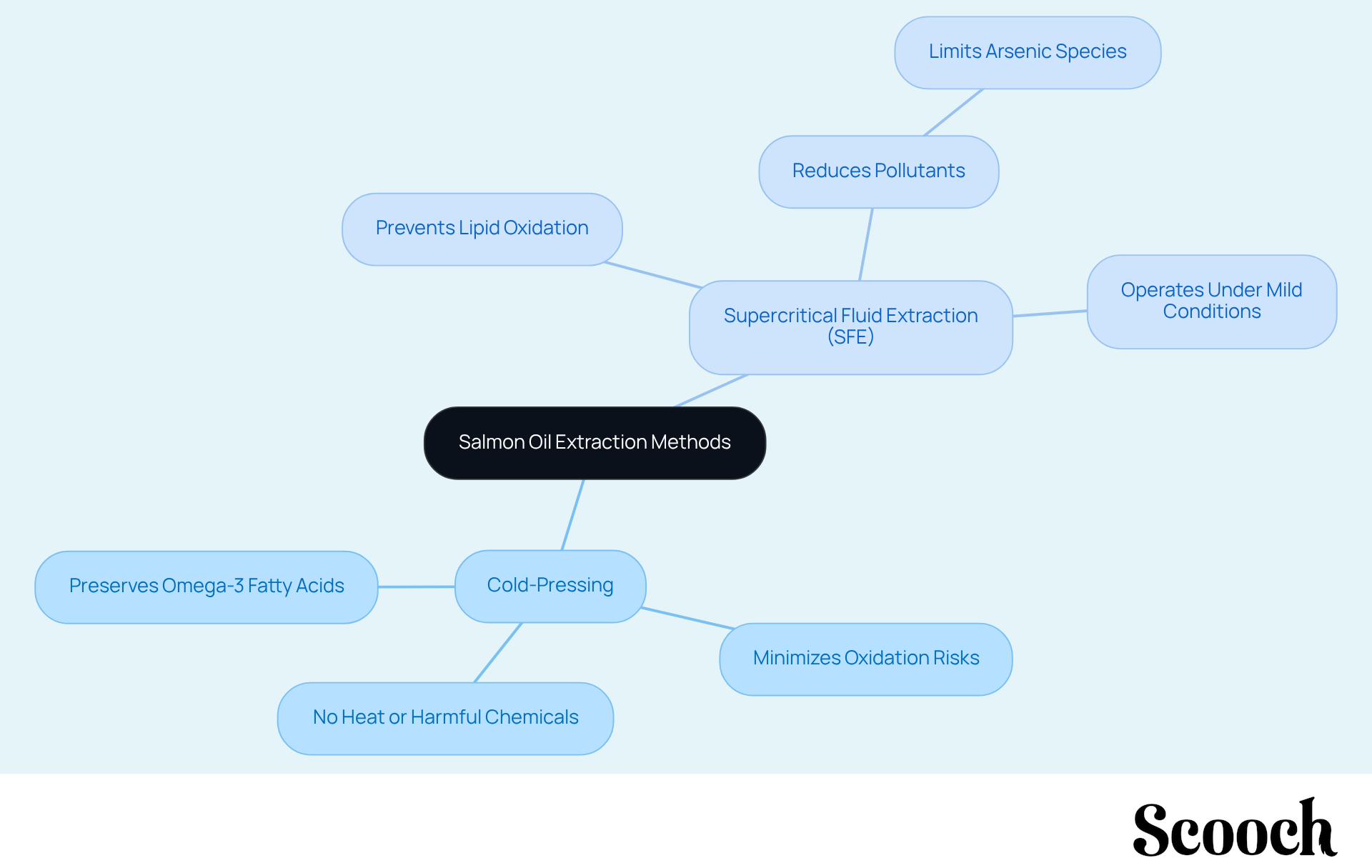
Conclusion
Have you ever worried about your dog's health? Incorporating salmon oil into your dog's diet is a vital step towards enhancing their overall well-being. This powerful supplement, rich in omega-3 fatty acids like EPA and DHA, plays a crucial role in promoting healthy skin, a shiny coat, and improved joint function. By understanding the benefits and proper administration of salmon oil, you can make informed decisions that significantly contribute to your furry friend's vitality.
This article highlights several key points regarding the advantages of salmon oil:
- It can reduce inflammation.
- It supports cognitive function.
- It can alleviate anxiety in dogs.
Moreover, it emphasises the importance of choosing high-quality products and adhering to proper dosage guidelines to avoid potential side effects. Consider reputable brands like Scooch, which offer vet-formulated supplements ensuring safety and efficacy.
Ultimately, prioritising your canine companion's health through the incorporation of salmon oil can lead to remarkable improvements in their quality of life. By taking proactive steps—such as consulting with a veterinarian and selecting high-quality supplements—you can empower your dog to thrive. They will enjoy the benefits of enhanced mobility, skin health, and overall well-being. Embracing this knowledge not only enriches your pet's life but also strengthens the bond between you and your beloved companion.
Frequently Asked Questions
What is salmon oil and what are its main components?
Salmon oil is a dietary supplement derived from the fatty tissues of fish, particularly known for its high concentration of omega-3 fatty acids, specifically eicosapentaenoic acid (EPA) and docosahexaenoic acid (DHA).
How does salmon oil benefit dogs?
Salmon oil supports various physiological functions in dogs, including immune response, skin condition, and cognitive function. It promotes healthy skin and a glossy coat, alleviates itchiness and dryness, and enhances joint condition, particularly in older dogs or those with osteoarthritis.
What are the sources of salmon oil?
Salmon oil can be sourced from both wild-caught and farmed fish, with the highest quality oils typically obtained through cold-pressing methods to maintain their nutritional integrity.
How does omega-3 fatty acid supplementation affect a dog's immune system?
A diet rich in omega-3 fatty acids can strengthen the immune system of dogs at all life stages, providing immune-boosting benefits even for healthy pets.
Can salmon oil improve cognitive function in dogs?
Yes, research has shown that canines supplemented with EPA and DHA demonstrated enhanced cognitive performance, highlighting the significance of these nutrients for brain function.
What additional benefits does omega-3 supplementation offer?
Omega-3 supplementation has been associated with decreased pain levels in dogs, particularly those with joint problems or inflammatory conditions, and can also help alleviate anxiety, contributing to overall mental well-being.
Are all omega-3 supplements the same?
No, not all omega-3 supplements contain sufficient EPA and DHA, so it is important to choose reputable brands like Scooch to ensure quality.
Should I consult a veterinarian before giving my dog salmon oil?
Yes, it is crucial to consult a veterinarian when introducing fish oil supplements into your dog's diet to ensure safe and effective use.
What potential side effects should be considered when using salmon oil?
Potential side effects of salmon oil supplementation may include gastrointestinal upset, which should be taken into account before use.
List of Sources
- Define Salmon Oil: Composition and Sources
- The Ins and Outs of Salmon Oil - My Pet Nutritionist (https://mypetnutritionist.com/post/the-ins-and-outs-of-salmon-oil)
- Why Dogs Needs Omega-3 Supplements: Benefits and Sources (https://qrillpet.com/blog-and-news/why-dogs-need-omega-3-supplements)
- Fish Oil for Dogs: Benefits, Dosage, and Vet Pick (https://petmd.com/dog/general-health/fish-oil-for-dogs)
- Healthy Paws, Happy Hearts: The Business Benefits of Salmon Oil… (https://buitelaargroup.com/news/healthy-paws-happy-hearts-the-business-benefits-of-salmon-oil-supplements-for-dogs)
- A Spotlight On Salmon Oil - Cotswold RAW (https://cotswoldraw.com/blog-headlines/product-spotlight-salmon-oil?srsltid=AfmBOop6T5UouIoHoftKTHBBrJa4Pe7Yl0vbxamuDxBi3cxufOGM9Jjn)
- Explore Health Benefits: Skin, Coat, and Joint Support
- Is salmon oil good for dogs? | Nature’s Menu (https://naturesmenu.co.uk/blog-is-salmon-oil-good-for-dogs.html)
- Discover the 9 Science-Backed Benefits of Salmon Oil for Dogs | Brilliant Petcare (https://brilliantpetcare.com/benefits-of-salmon-oil-for-dogs)
- Natural & Nutritious Dog Food | Edgard & Cooper (https://edgardcooper.com/en/blog/salmon-oil-for-dogs-10-amazing-benefits-for-your-loyal-companion)
- The benefits of Salmon Oil for dogs | Pooch & Mutt (https://poochandmutt.co.uk/blogs/supplements/benefits-of-salmon-oil-for-dogs?srsltid=AfmBOoob2QNPEZMwFM-jIM3yj6k6XOP96BRIVTeBjDt-TQfwShU5eluY)
- 5 Benefits of Salmon Oil for Your Dog and Cat (https://aniforte.co.uk/blogs/news/salmon-oil-5-reasons-for-supplementing-it)
- Incorporate Salmon Oil: Dosage and Administration Tips
- AniForte® Salmon Oil - For Dogs, Cats and Horses (https://aniforte.co.uk/products/natural-salmon-oil-for-dogs)
- Salmon Oil for Dogs: How Much to Give and How Often (https://poochiful.co.uk/blogs/news/salmon-oil-for-dogs?srsltid=AfmBOopq2NSc_GUBLQL_9CqHeXTHXDmng4nsuopoT49VhFwjbcesMUlr)
- How do I add salmon oil to my dogs diet? (https://walkeranddrake.com/blogs/news/how-do-i-add-salmon-oil-to-my-dogs-diet?srsltid=AfmBOorXVMVw3dEfE074_TkooF2HLICYQ7305XVczDpCLjUWEXm8pZID)
- Incorporating Salmon Oil Into Your Dog’s Diet: A Beginner’s Guide (https://rawpaws.net/blogs/blog/incorporating-salmon-oil-into-your-dog-s-diet-a-beginner-s-guide?srsltid=AfmBOop4wRRx7sZeH4fOUufJu3grJdjBCqQKCz28-IY3qg514ASRwOh2)
- Understand Extraction Methods: Quality and Purity of Salmon Oil
- The Ins and Outs of Salmon Oil - My Pet Nutritionist (https://mypetnutritionist.com/post/the-ins-and-outs-of-salmon-oil)
- Effects of Oil Extraction Methods on Physical and Chemical Properties of Red Salmon Oils (Oncorhynchus nerka) (https://aocs.onlinelibrary.wiley.com/doi/10.1007/s11746-011-1824-x)
- Study backs CO2 extraction technique for higher quality fish oils (https://nutraingredients.com/Article/2011/10/20/Study-backs-CO2-extraction-technique-for-higher-quality-fish-oils)
- Fish oil: Omega-3 quality depends on extraction methods (https://en.omegor.com/blogs/omega-3-special/fish-oil-omega-3-extraction-method)
- Comparative studies on the yield and quality of solvent-extracted oil from salmon skin (https://sciencedirect.com/science/article/abs/pii/S0260877408005906)
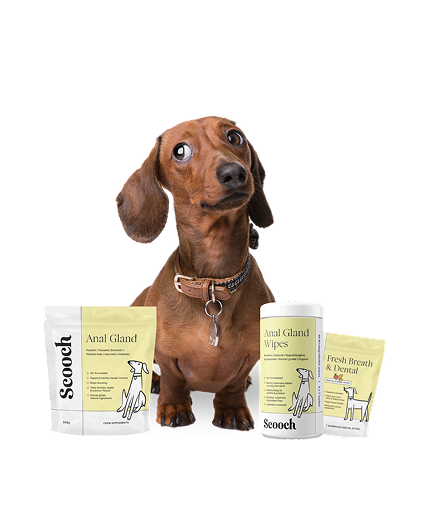
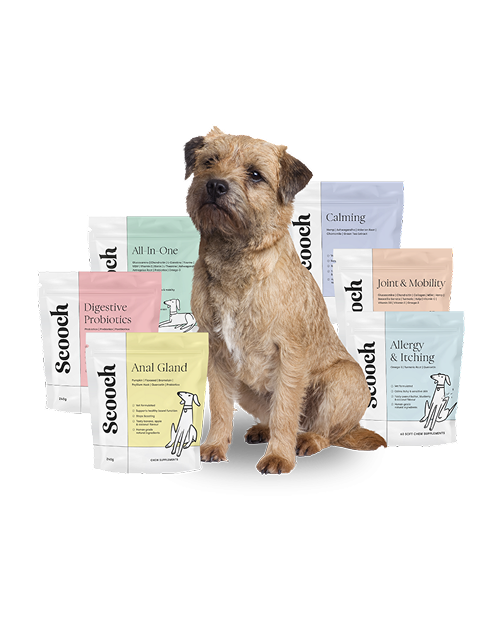
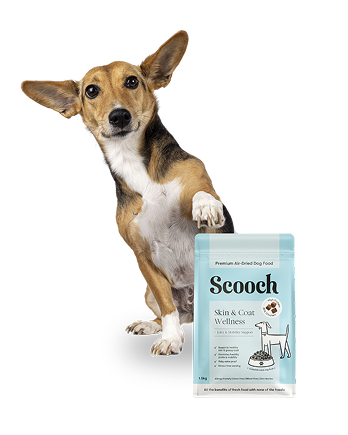
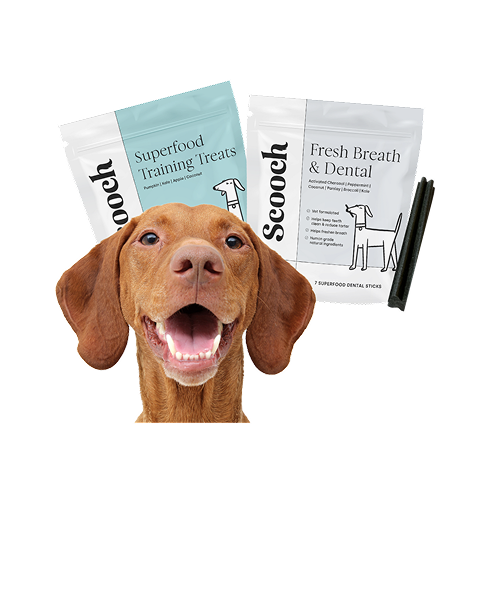
 Scooch health
Scooch health